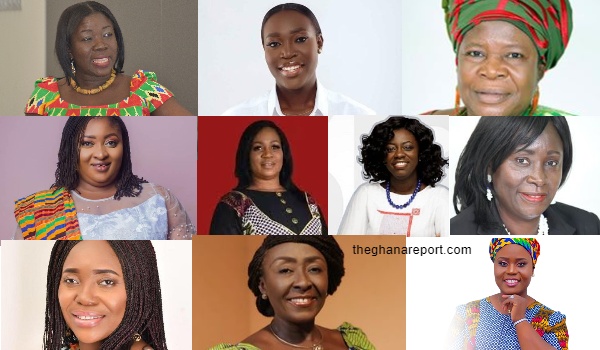It’s 20:20 as NPP, NDC send 40 female MPs to Parliament
As Ghana’s gender activists clamour for more female representation in Ghana’s Parliament, Ghanaian electorates responded, albeit marginal.
A total of 40 women, including 16 first term and 25 retained female lawmakers will be part of Ghana’s next Parliament.
The 2020 female victors will be three more than the 2016 figure–37. However, for the first time in Ghana’s history, the two leading parties have elected the same number of women to Parliament.
The 40 were among 126 candidates who contested the elections. The newly elected female MPs are just 15% of the 275 new legislators who will be sworn-in on the midnight of January 6, next year.
With the regional breakdown; Greater Accra has the highest with 15, followed by Central, 5; Ashanti, 5; Volta, 4; Eastern, 3; Upper East, 2; Ahafo, Oti, North East, Savannah, Western and Bono East regions have one representative each.
Notable among the new faces are Shiela Bartels of Ablekuma North (NPP), Dakoa Newman of Okaikwei South (NPP), Abla Dzifa Gomashie of Keth South (NDC) and Gizella Tetteh Abgotui of Awutu Senya West (NDC).
READ: Only 5.8% of all 1,610 MPs elected since 1992 are women
The 2016 elections
In the 2016 election, out of 1,158 aspirants who contested for parliamentary seats, 136 were women. That is only 11.7%.
Of the 136 female candidates, 40 were from the NDC and 29 from the NPP; the remaining 67 were from smaller parties or were independent candidates.
Out of the 136, only 37 won, 13 from the NDC, and 24 from the NPP.
Theghanareport.com brings you a breakdown of the 2020 representation
| NO. | NAME | CONSTITUENCY | PARTY | TERM |
| 1. | Abla Dzifa Gomashie | Ketu South | NDC | First |
| 2. | Adelaide Ntim | Nsuta Kwaman Beposo | NPP | First |
| 3. | Akanvariba Lamisi Lydia | Tempane | NDC | First |
| 4. | Elizabeth Ofosu Adjare | Techiman North | NDC | First |
| 5. | Dorcas Affo-Toffey | Jomoro | NDC | First |
| 6. | Shiela Bartels | Ablekuma North | NPP | First |
| 7. | Rita Naa Odorley Sowah | La Dadekotopon | NDC | First |
| 8. | Theresa Lardi Awuni | Okaikwei North | NDC | First |
| 9. | Dokoa Newman | Okaikwei South | NPP | First |
| 10. | Agnes Naa Momo Lartey | Krowor | NDC | First |
| 11. | Gizella Tetteh-Agbotui | Awutu Senya West | NDC | First |
| 12. | Ophelia Kwansah Hayford | Mfansteman | NPP | First |
| 13. | Gifty Twum Ampofo | Abuakwa North | NPP | Third |
| 14. | Abena Osei-Asare | Atiwa West | NPP | Second |
| 15. | Laadi Ayii Ayamba | Pusiga | NDC | Third |
| 16. | Ursula Owusu-Ekuful | Ablekuma West | NPP | Third |
| 17. | Zanetor Agyeman Rawlings | Klottey Korle | NDC | Second |
| 18. | Hajia Lariba Zuwera Abudu | Walewale | NPP | First |
| 19. | Oheneba Dokua Asiamah-Adjei | Akropong | NPP | Second |
| 20. | Freda Prempeh | Tano North | NPP | Third |
| 21. | Mavis Nkansah Boadu | Afigya Sekyere East | NPP | Second |
| 22. | Patricia Apiagyei | Asokwa | NPP | Third |
| 23. | Ama Pomaa Boateng | Juaben | NPP | Third |
| 24. | Francisca Oteng Mensah | Kwabre East | NPP | Second |
| 25. | Queenstar Pokua Sawyer | Agona East | NDC | Third |
| 26. | Cynthia Mamle Morrison | Agona West | NPP | Second |
| 27. | Naana Eyiah Quansah | Gomoa Central | NPP | Second |
| 28. | Comfort Doyoe Cudjoe-Ghansah | Ada | NDC | Third |
| 29. | Lydia Alhassan | Ayawaso West Wuogon | NPP | Second |
| 30. | Sarah Adwoa Safo | Dome Kwabenya | NPP | Third |
| 31. | Sophia Karen Edem Ackuaku | Domeabra Obom | NDC | Second |
| 32. | Theresa Lardi Awuni | Okaikwei North | NDC | First |
| 33. | Linda Obenewaa Akweley Ocloo | Shai Osudoku | NDC | Second |
| 34. | Tina Gifty Naa Ayeley Mensah | Weija | NPP | Second |
| 35. | Helen Adjoa Ntoso | Krachi West | NDC | Third |
| 36. | Angela Oforiwaa Alorwu – Tay | Afadjato South | NDC | Second |
| 37. | Joycelyn Tetteh | North Dayi | NDC | Second |
| 38. | Mavis Hawa Koomaon | Awutu Senya East | NPP | Third |
| 39. | Adjoa Della Sowah | Kpando | NDC | Third |
| 40. | Zuwera Mohammed Ibrahimah | Salaga South | NDC | First |
Despite these gains, significant obstacles remain for women seeking elective office. Although Ghana’s constitution mandates that all appointed and elected bodies do not discriminate against women, very few women occupy elected office in the country.
In a country in which politics is male-dominated, cultural, economic, and political factors discourage women from participating in the nation’s electoral process. These factors include inadequate support from political parties (particularly in the primaries), a lack of financial resources and gender stereotyping.
In the first two years of his presidency, Nana Akufo-Addo made commitments to the passage of an Affirmative Action Bill in his State of the Nation Addresses.
But two years down the line, the bill is still in Parliament less than 25 days to the end of the tenure of this Parliament.
Parliament will resume on December 14.



